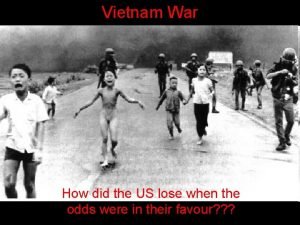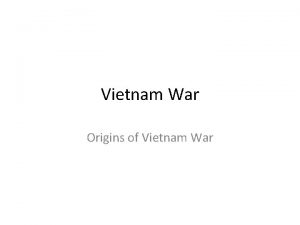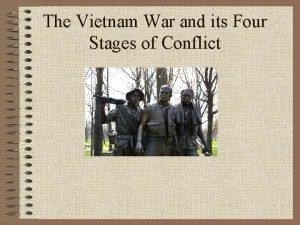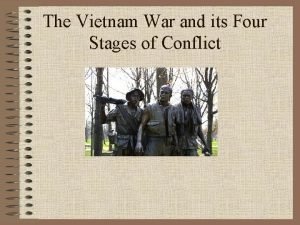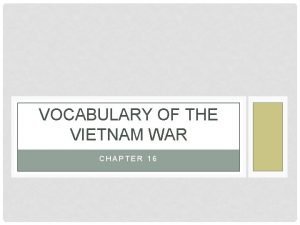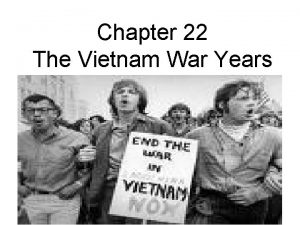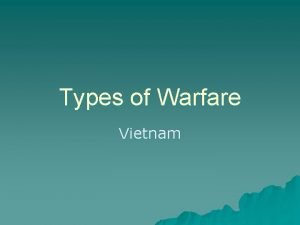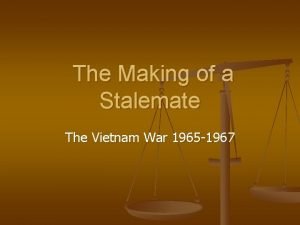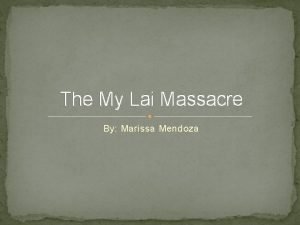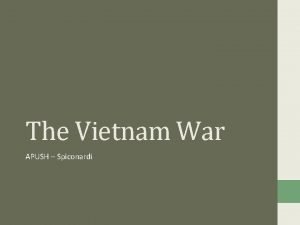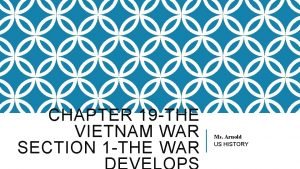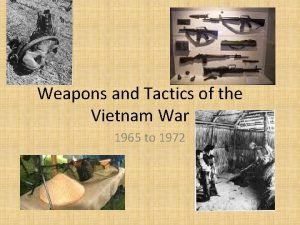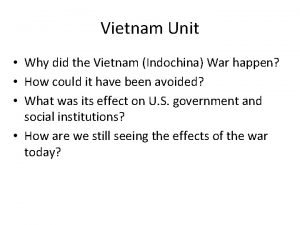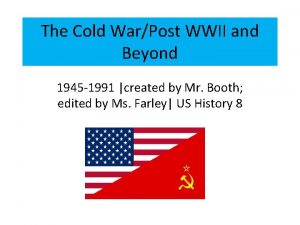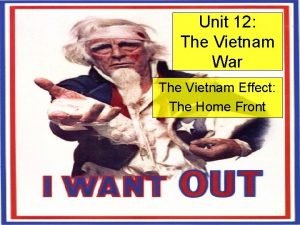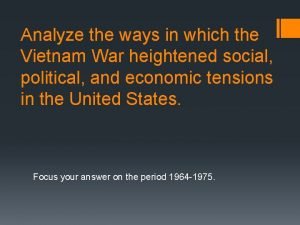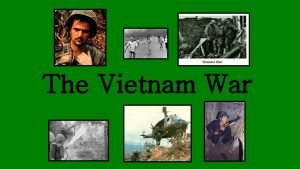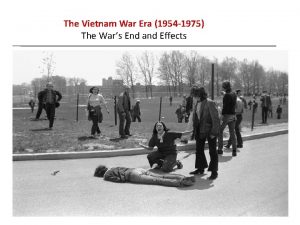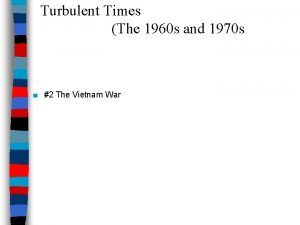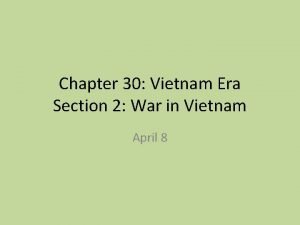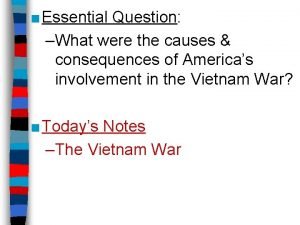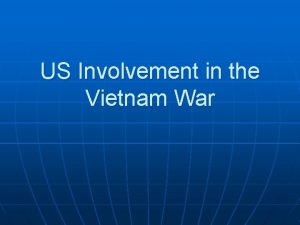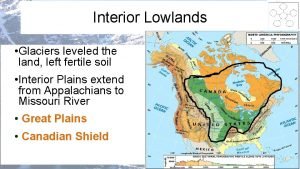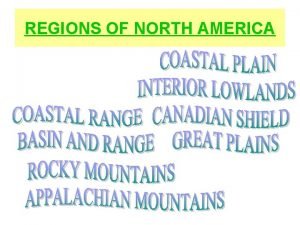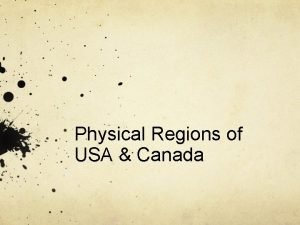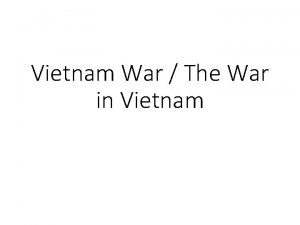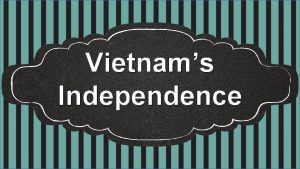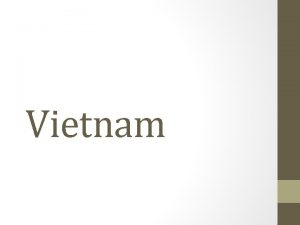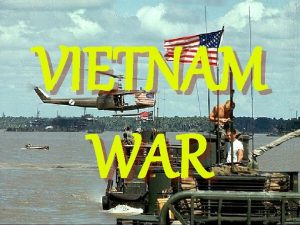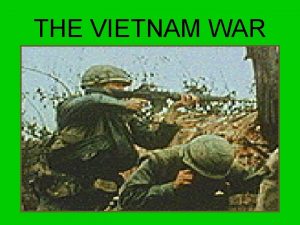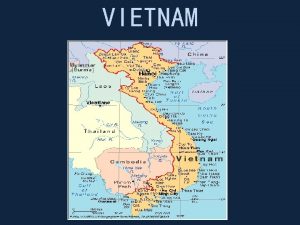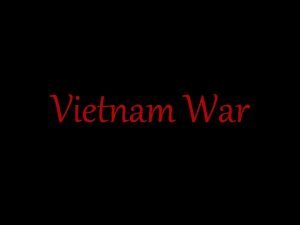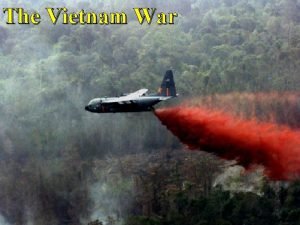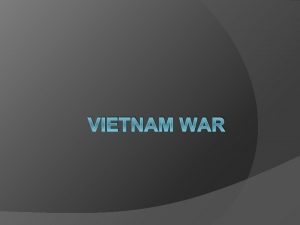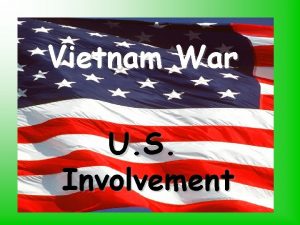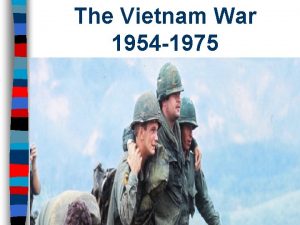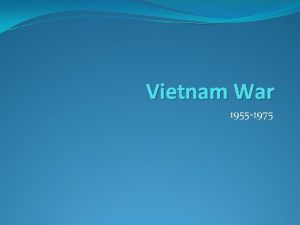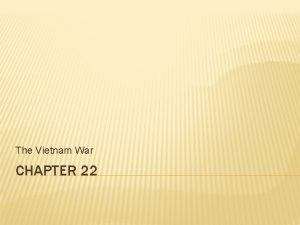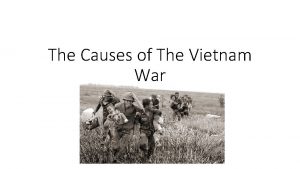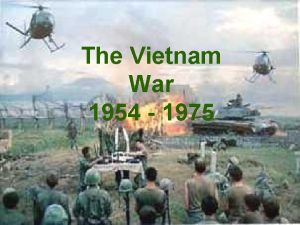Vietnam War Vietnams Lowlands Vietnams Highlands Colonialism in






























- Slides: 30

Vietnam War



Vietnam’s Lowlands

Vietnam’s Highlands

Colonialism in Vietnam China France Japan France Why? Empire & Resources: rice, rubber, coal

Geneva Conference, 1954: French leave & North and South Vietnam are created

What Do You Call the War? • In the US: Vietnam War? Or just “Vietnam”—the name of a country is shorthand for long and divisive war • In Vietnam: American War? -the “American” War linked to ancient patriotic struggles against foreign domination

What Are We Fighting For? • U. S. leaders: To contain Communism • Communist leaders: To liberate South Vietnam from foreign control and unify the nation under communism • American soldiers: To survive, to protect buddies, to “payback” enemy (not to gain territory or promote democracy or defend civilians from aggression) • Communist-led soldiers and guerrillas: “sacred cause” and to avenge loss of family and friends

When Did the War Start? • Communist leaders: When the U. S. supported the French reconquest of Indochina in 1946 • U. S. leaders: When Communist-led insurgents began attacking the U. S. & French-backed government of Ngo Dinh Diem in the late 1950 s • American public: no clear beginning

South Vietnam Under Ngo Dinh Diem’s Leadership

Gulf of Tonkin Incident: US begins its FIGHTING ROLE August, 1964

Strategy: Search and Destroy Troop Numbers: (Kennedy)1963: 16, 500 (Johnson) 1964: 23, 000** (Johnson) 1965: 184, 000 (Johnson) 1968: 536, 100 (Nixon) 1969: 543, 400 **Combat Role Begins

What Were the Strategies of Each Side? • “If we have the people, we have the weapons. ” Ho Chi Minh (N. Vietnam/Communists) • “The solution in Vietnam is more bombs, more shells, more napalm. . . until the other side cracks and gives up. ” Gen. William Depuy (US) • “We agreed to fight a war that we could either lose or tie, but not win. The best we could ever do is keep half the country. ” South Vietnamese army (ARVN) soldier Truong Tran

Viet Cong Dig Tunnels

Tons of Bombs Dropped by U. S. World War II: 2. 2 million tons Korean War: 500, 000 tons Vietnam War: 8 million tons

B-52 Stratofortress: Drops 27 tons of bombs from six miles high

Napalm: Fire bombs made from jellied gasoline




1968, ARVN with Vietcong Suspect

Napalm Attack on S. Vietnamese Village, 1972

My Lai Massacre, March 1968

Kent State (Ohio), May 4, 1970


Burst of Joy, 1973

How Did The North Vietnamese and the Viet Cong Win? • Political support proved greater than U. S. firepower • The American backed gov’t in Saigon lacked political support of its people • The Communist side had far more support • A great military power can occupy a foreign country, BUT • Military control is not the same thing as political support or legitimacy

Phan Xuan Sinh, South Vietnamese officer (ARVN) Finds letters to Communist troops: “I was amazed by the intensity of feelings they expressed. They had such a deep commitment to the war and so much hatred for us, the enemy. They said things like, ‘Don’t worry about us. We’ll survive. Just do your best to destroy the enemy’. . . We never had such strong feelings about the war. I think that’s why they were able to prevail. ” p. 27 in Patriots

 Korean war vietnam war venn diagram
Korean war vietnam war venn diagram Vietnam war
Vietnam war The vietnam war
The vietnam war Stages of vietnam war
Stages of vietnam war Stages of the vietnam war
Stages of the vietnam war Vietnam war vocabulary
Vietnam war vocabulary The vietnam war years chapter 22
The vietnam war years chapter 22 Vietnam war traps
Vietnam war traps Vietnam war
Vietnam war Did the vietnam war end in a stalemate
Did the vietnam war end in a stalemate Marissa lai
Marissa lai Vietnam war apush
Vietnam war apush Chapter 19 the vietnam war
Chapter 19 the vietnam war Us weapons vietnam war
Us weapons vietnam war Reason for vietnam war
Reason for vietnam war Napalm vietnam war
Napalm vietnam war Civil war digging deeper webquest answers
Civil war digging deeper webquest answers Pro vietnam war slogans
Pro vietnam war slogans Agent orange and napalm
Agent orange and napalm Analyze the ways in which the vietnam war heightened social
Analyze the ways in which the vietnam war heightened social Vietnam war results
Vietnam war results Effects of the vietnam war
Effects of the vietnam war Vietnam war 1960
Vietnam war 1960 Causes of the vietnam war
Causes of the vietnam war What were the causes and effects of the vietnam war
What were the causes and effects of the vietnam war Vietnam
Vietnam Brainpop land biomes quiz answers
Brainpop land biomes quiz answers Canadian landform regions
Canadian landform regions Interior lowlands facts
Interior lowlands facts Oldest landform region in canada
Oldest landform region in canada Where is the interior plains region located
Where is the interior plains region located

